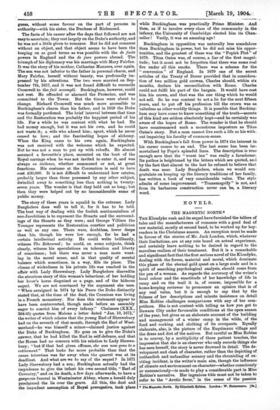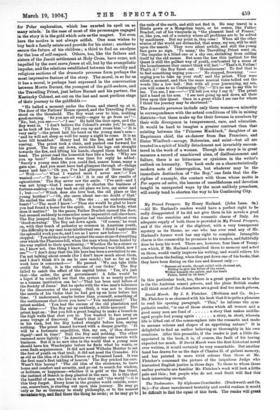THE MAGNETIC NORTH.*
THE IClondyke rush and its sequel have furnished the tellers of tales and the manufacturers of romance with a good deal of raw material, mostly at second hand, to be worked up for boy- readers in the Christmas season. An exception must be made in favour of the stories of Mr. Jack London, which, whatever their limitations, are at any rate based on actual experience, and certainly leave nothing to be desired in regard to the merciless realism of their treatment. But it is a remarkable and significant fact that the first serious novel of the Klondyke, dealing with the forces, material and moral, which dominate this phase of the eternal gold quest on a large scale and in a spirit of searching psychological analysis, should come from the pen of a woman. As regards the accuracy of the writer's local colour and the exactitude of her knowledge of life in camp and on the trail it is, of course, impossible for a home-keeping reviewer to pronounce an opinion that is of any real value, but it is enough to say that by the fulness of her descriptions and minute insistence on detail Miss Robins challenges comparisons with any of her com- petitors. She is not content with telling us how you get to Dawson City under favourable conditions at the open season
of the year, but gives us an elaborate account of the building and management of a winter camp in the wilds, of the food and cooking and clothing of its occupants Equally elaborate, also, is the picture of the Esquimau' village and the dress and diet of the natives. But careful as Miss Robins is to convey, by a multiplicity of these patient touches, the impression that she is an observer who only records things she has seen herself, the story is never drowned in detail. The de- velopment and clash of character, rather than the depicting of outlandish and unfamiliar scenery and the chronicling of ex- citing incident, is the writer's main aim, though the influence of climate and environment on character—whether consciously or unconsciously—is made to play a considerable part in Miss ;Robins's narrative. Her ingenious title must not be taken to refer to the "Arctic fever," in the sense of the passion
for Polar exploration, which has exerted its spell on so many minds.. In the case of most of the personages engaged in the story it is the gold which acts as the magnet. Yet even here the motive is not always selfish. One man wishes to buy back a family estate and provide for his sister; another to secure the future of his children ; a third to find an anodyne for the loss of self-respect. Others, too, like the fathers and sisters of the Jesuit settlement at Holy Cross, have come, not impelled by the auri sacra fames at all, but by the evangelistic impulse, and the relations established between the worldly and religious sections of the dramatis personae form perhaps the most impressive feature of the story. The moral, in so far as it has a moral, is perhaps best expressed in the conversation between Morris Burnet, the youngest of the gold-seekers, and the Travelling Priest, just before Burnet and his partner, the Kentucky Colonel, set out on the last and most perilous stage of their journey to the goldfields :- "He halted a moment under the Cross, and stared up at it. The door of the Fathers' House opened, and the Travelling Priest stood on the threshold. The Boy went over to him, nodding good-morning. So you are all ready—eager to go from us ?'— ' No ; but, you see—' 'I see.' He held the door open, and the
Boy went in. don't believe the Colonel's awake yet,' he said, as he took off his furs. I'll just run up and rouse him.'—' It is very early '—the priest laid his hand on the young man's arm— 'and he will not sleep so well for many a night to come. It is an hour till breakfast.' Henry had lit the fire, and now left it roaring. The priest took a chair, and pushed one forward for his guest. The Boy sat down, stretched his legs out straight towards the fire, and lifting his hands, clasped them behind his head. The priest read the homesick face like a book. Why are you up here?' Before there was time for reply he added: Surely a young man like you could find, nearer home, many a gate ajar. And you must have had glimpses through of—things many and fair.'—' Oh yes, I've had glimpses of those things.'
Well—'—' What I wanted most I never saw.'—' You wanted—'—' To be—sure.'—'Ah ! it is one of the results of agnosticism.' The Boy never saw the smile. I've said—and I was not lying—that I came away to shorten the business of fortune-making—to buy back an old place we love, my sister and I; but—'—' Which does she love best, the old place or the young brother?'—' Oh, she cares about me—no doubt o' that.' He smiled the smile of faith. 'Has she . . . an understanding heart? The most I know.'—' Then she would be glad to know you had found a home for the spirit. A home for the body, what does it matter ? ' In the pause, Father Brachet opened the door, but seemed suddenly to remember some imperative call elsewhere. The Boy jumped up, but the Superior had vanished without even Good-morning.' The Boy sat down again. Of course,' he went on, with that touch of pedantry so common in American youth, the difficulty in my case is an intellectual one. I think I appreciate the splendid work you do, and I see as I never saw before—' He stopped. 'You strike your foot against the same stone of stumbling over which the Pharisees fell, when the man whom Jesus healed by the way replied to their questioning : "Whether He be a sinner or no, I know not. One thing I know, that whereas I was blind, now I see."—' I don't deny that the life here has been a revelation to me. I'm not talking about creeds (for I don't know much about them, and I don't think it's in me to care much) ; but so far as the work here is concerned—' He paused. We can take little credit for that; it is the outcome of our Order.' The Boy failed to catch the effect of the capital letter. Yes, it's just that—the order, the good government! A fella would be a bigot if he couldn't see that the system is as nearly perfect as a human institution can be.'—' That has been said before of the Society of Jesus.' But he spoke with the wise man's tolerance for the discoveries of the young. Still, it was not to discuss the merits of his Order that he had got up an hour before his time. 'I understand, maybe better than yourself, something of the restlessness that drove you here.'—' You understand ? ' The priest nodded. You had the excuse of the old plantation and the sister—' The Boy sat up suddenly, a little annoyed. The priest kept on : But you felt a great longing to make a breach in the high walls that shut you in. You wanted to fare away on some voyage of discovery. Wasn't that it?' He paused now in his turn, but the Boy looked straight before him, saying nothing. The priest leaned forward with a deeper gravity. It will be a fortunate expedition, this, my son, if thou discover thyself—and in time!' Still the Boy said nothing. The other resumed more lightly: In America we combine our travels with business. But it is no new idea in the world that a young man should have his Wanderjahr before he finds what he wants, or even finds acquiescence. It did not need Wilhelm Meister to set the feet of youth on that trail; it did not need the Crusades. It's as old as the idea of a Golden Fleece or a Promised Land. It was the first man's first inkling of heaven.' The Boy pricked his ears. Wasn't this heresy? The old idea of the strenuous, to leave home and comfort and security, and go out to search for wisdom, or holiness, or happiness—whether it is gold or the San Grad, the instinct of Search is deep planted in the race. It is this that the handful of men who live in what they call "the world "—it is this they forget. Every hour in the greater world outside, some- one, somewhere, is starting out upon this journey. He may go only as far as Germany to study philosophy, or to the nearest mountain-top, and find there the thing he seeks; or he may go to the ends of the earth, and still not find it. He may travel in a Hindu gown or a Mongolian tunic, or he comes, like Father Brachet, out of his vineyards in "the pleasant land of France," or, like you, out of a country where all problems are to be solved by machinery. But my point is, they come ! When all the other armies of the world are disbanded, that army, my son, will be still upon the march.' They were silent awhile, and still the young face gave no sign. To many,' the Travelling Priest went on, 'the impulse is a blind one or a shy one, shrinking from calling itself by the old names. But none the less this instinct for the Quest is still the gallant way of youth, oon.sronted by a sense of the homelessness they cannot think will last.'—' That's it, Father! That's it !' the Boy burst out. Homelessness! To feel that is to feel something urging you—' He stopped, frowning. '- urging you to take up your staff,' said the priest. They were silent a moment, and then the same musical voice tolled out the words like a low bell: But with all your journeying, my son, you will come to no Continuing It's no use to say this to me. You see, I am—'—' I'll tell you why I say it.' The priest laid a hand on his arm. I see men going up and down all their lives upon this Quest. Once in a great while I see one for whom I think the journey may be shortened."
The dramatis personae include only three women—a minority in correspondence with the actual conditions of life in mining districts—but these make up for their fewness in numbers by their wide divergence in temperament, race, and education. It would be hard to imagine a greater contrast than that existing between the "Princess Muckluck," daughter of an Esquimaux chief, the ex-dancer from San Francisco, and Sister Winifred—savage, Bohemian, and saint—but all are treated in a spirit of kindly detachment not invariably encoun- tered in the work of a woman. Though the story is in great measure a record of unachieved aims, of disillusionment and failure, there is no bitterness or cynicism in the writer's outlook on humanity. The book ends on a characteristically modern note of interrogation, but whatever may be the- immediate destination of "the Boy," one feels that the dis- cipline of example, the contact with those whose motto le- Per aspera ad astra, the lessons of unselfishneas and devotion taught in unexpected ways by the most unlikely preachers, will surely tend to shorten the way to his Continuing City.











































 Previous page
Previous page